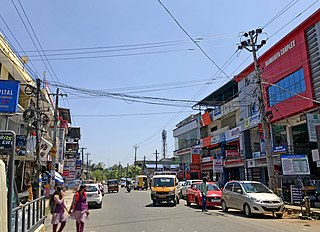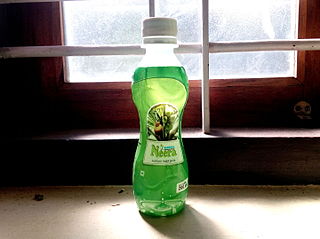
The coconut tree is a member of the palm tree family (Arecaceae) and the only living species of the genus Cocos. The term "coconut" can refer to the whole coconut palm, the seed, or the fruit, which botanically is a drupe, not a nut. They are ubiquitous in coastal tropical regions and are a cultural icon of the tropics.

Sadya, also spelt as Sadhya, is a meal of Kerala origin and of importance to all Malayalis, consisting of a variety of traditional vegetarian dishes usually served on a banana leaf as lunch. Sadya is typically served as a traditional feast for Onam and Vishu, along with other special occasions such as birthdays, weddings and temple festivals. In Brahmanical tradition, the term "sadya" (सद्य) in Sanskrit means "immediate," "soon," or "quickly." It is derived from the root "sādhyā" (साध्या), meaning "achievable" or "attainable." In South Indian cuisine, especially in Kerala, "sadya" came from the concept of 'immediate brahmanical feast'.

Alathur is a town, taluk and gram panchayat in Palakkad District, Kerala, India. It is the administrative headquarters of the Alathur Taluk and is situated about 24 km from the district headquarters Palakkad through National Highway 544.Gayathripuzha River, one of the tributary of Bharathapuzha, flows through Alathur. Alathur is one among the 20 Parliamentary Constituencies in Kerala. A Mini Civil Station is also located here which provides government related services.

An appam or hoppers is a type of thin pancake originating from South India and Sri Lanka. It is made with fermented rice batter and coconut milk, traditionally cooked in an appachatti, a deep pan similar in shape to a wok. It is part of Tamil cuisine and Kerala cuisine found in the Indian states of Tamil Nadu and Kerala, and in Sri Lanka. Appam is most frequently served for breakfast or dinner, often with a topping such as an egg.

The economy of Kerala is the 9th largest in India, with an annual gross state product (GSP) of ₹9.78 lakh crore in 2020–2021. Per-capita GSP of Kerala during the same period is ₹257,711 (US$3,100), the sixth largest in India. In 2019–20, the tertiary sector contributed around 63% of the state's GSVA, compared to 28% by secondary sector, and 8% by primary sector.

Kerala cuisine is a culinary style originated in the Kerala, a state on the southwestern Malabar Coast of India. Kerala cuisine offers a multitude of both vegetarian and non-vegetarian dishes prepared using fish, poultry and red meat with rice as a typical accompaniment. Chillies, curry leaves, coconut, mustard seeds, turmeric, tamarind, asafoetida and other spices are also used in the preparation.
Coconut Development Board (CDB) is a statutory body established under the Ministry of Agriculture of the Government of India for the integrated development of coconut and coconut-related products. Coconut Development Board is a statutory body established by the Government of India for the integrated development of coconut production and utilization in the country with focus on productivity increase and product diversification. The Board which came into existence on 12 January 1981, functions under the administrative control of the Ministry of Agriculture, Government of India, with its headquarters at Kochi in Kerala and regional Offices at Bangalore in Karnataka, Chennai in Tamil Nadu and Guwahati in Assam. There are six state centres situated at Bhubaneswar in Orissa, Calcutta in West Bengal, Patna in Bihar, Thane in Maharashtra, Hyderabad in Telangana and Port Blair in the Union Territory of Andaman & Nicobar Islands. The Board has 9 Demonstration cum Seed Production (DSP) Farms in different locations of the country and now 7 farms are maintained. A Market Development cum Information Centre has established in Delhi. The Board has set up a Technology Development Centre at Vazhakulam near Aluva in Kerala.

Kalliasseri is a census town in Kannur district in the Indian state of Kerala. Kalliaseri Panchayat comprises two villages: Kalliasseri and Irinave.

Peermade, also spelt Peerumedu is a village, Grama Panchayat and hill station in the state of Kerala, in southwestern India. It lies 915 metres (3,002 ft) above sea level in the Western Ghats (Sahyadri) about 85 kilometres (53 mi) east of Kottayam on the way to Thekkady through the nearby city of Kanjirappally.

Chemperi is a town on the bank of the Chemperi River, in the Western Ghat, in the Kannur district of South India. It is characterized by its production and export of rubber and spices, its beautiful hillocks, and its serene streams. Village and Panchayath of Chemperi is Eruvessi. Both Panchayath and Village offices of Eruvessi are located in Chemperi. Also Lourde Matha Forane Church, Chemperi is another attraction. Paithalmala and Palakkayam Thattu is also a few kilometres away.

Neera, also called palm nectar, is a sap extracted from the inflorescence of various species of toddy palms and used as a drink. Neera extraction is generally performed before sunrise. It is sweet, translucent in colour. It is susceptible to natural fermentation at ambient temperature within a few hours of extraction, and is also known as palm wine. Once fermented, Neera becomes toddy. Neera is widely consumed in India, Sri Lanka, Africa, Malaysia, Indonesia, Thailand, and Myanmar. Neera is not the juice made from palm fruit.

Aralam is a village and Grama Panchayat in Kannur district in the Indian state of Kerala.

Payyavoor is a small town in Kannur district in the Indian state of Kerala. It's the headquarters of Payyavoor Grama Panchayat.
Anthikad is a village in Thrissur district in the state of Kerala, India. It is in Thrissur Thaluk, Nattika constituency and Anthikad Block. Manalur and Thanyam are the nearest panchayats. Anthikad is famous for toddy production and paddy fields. Anthikad won `Nelkathir' award for best paddy cultivation in Kerala in 2008. Anthikad is the headquarter for a major financial enterprise, the Peringottukara Namboothiri Yogashkema Sabha Credit & Investment Company Ltd., which was formed in the year 1907.
Krishi Vigyan Kendra Kannur is a front-line agricultural extension center and one of the 700 KVKs financed by the Indian Council of Agricultural Research (ICAR). It opened on 30 March 2004 on the premises of Pepper Research Station, Panniyoor under Kerala Agricultural University. KVK primarily works to influence the other extension systems of the district, caters to the training needs of the farmers and extension functionaries, and facilitates the spread of technologies tailored to the diverse environment of farmers.

Kerala Solvent Extractions Ltd, now known as KSE Ltd, is a company that is engaged in the manufacture of cattle feed, oil cake processing, and dairy products in Irinjalakkuda, Thrissur District, state of Kerala, India. The Company was incorporated on 25 September 1963 and began commercial operations in April 1972 by setting up Kerala's first solvent extraction plant to extract coconut oil from coconut oil cakes. Subsequently, in 1976 the company set up a plant to manufacture ready mixed cattle feed. In the last three decades, KSE has emerged as a leader in solvent extraction from coconut oil cakes and also the largest cattle feed producer and supplier in Kerala. In 2000, KSE entered the business of procuring, processing and marketing milk and milk products. In 2002, KSE started producing and marketing icecreams under the brand name 'Vesta'.

KERAFED is the top-level co-operative federation of coconut farmers in the southern Indian state of Kerala. KERAFED is also a producer and marketer of products based on coconut. It is the largest producer of coconut oil in India.
Kerala or Keralam are called ‘alam’ meaning ‘the land of’, and ‘kera’ meaning ‘coconut’. Jammed between the sea and coastal mountains, Kerala is subject to the monsoon rains that flood the land and the rice paddies on the subcontinent’s southern tip. Long growing seasons yield a coconut crop every 40 days, with each tree producing 20 to 30 coconuts per harvest. Keralites, most of whom seem to have at least four or five trees on their small plots of land, claim they are Kalpa Vriksham —“the trees of heaven.” They use the coconuts themselves for food, tender coconuts for water and spirituous toddy for drinking; the fronds for mats and roofs; the oil for cooking; and the husk fibre for a thriving rope industry. They are intrinsically tied to the culture and folklore well. It is a part of every celebration —as an ingredient in the Keralan delicacies prepared, as offering to the gods and to mark an auspicious occasion . Various terms like copra and coir are derived from the native Malayalam language.

The Kottankulangara Devi Temple is a Hindu temple to the goddess Durga Bhagavathy or Aadi Shakthi, the supreme mother of power, located in the village of Chavara, Kerala, India.

Thirumullavaram Beach, is one of the popular beaches in the city of Kollam and a tourist destination in the state of Kerala. The beach is situated at Thirumullavaram, an important neighbourhood of Kollam city. The beach is very famous for conducting the Karkidaka Vavubali rituals. Thousands of devotees arrive on the beach to perform the Vavubali Tharpanam every year. It is one of the most attractive beaches located in South India.

















